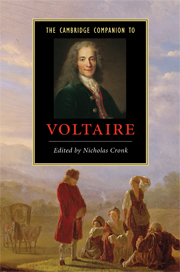Book contents
- Frontmatter
- Introduction
- 1 The making of a name: a life of Voltaire
- 2 Voltaire and authorship
- 3 Voltaire: philosopher or philosophe?
- 4 Voltaire and clandestine manuscripts
- 5 Voltaire and the myth of England
- 6 Voltaire’s masks: theatre and theatricality
- 7 Voltaire as story-teller
- 8 Candide
- 9 Voltaire and history
- 10 Voltaire’s correspondence
- 11 Voltaire: pamphlets and polemic
- 12 Voltaire and the politics of toleration
- 13 Voltaire and the Bible
- 14 The Voltaire effect
- Further reading
- Index
6 - Voltaire’s masks: theatre and theatricality
Published online by Cambridge University Press: 28 May 2009
- Frontmatter
- Introduction
- 1 The making of a name: a life of Voltaire
- 2 Voltaire and authorship
- 3 Voltaire: philosopher or philosophe?
- 4 Voltaire and clandestine manuscripts
- 5 Voltaire and the myth of England
- 6 Voltaire’s masks: theatre and theatricality
- 7 Voltaire as story-teller
- 8 Candide
- 9 Voltaire and history
- 10 Voltaire’s correspondence
- 11 Voltaire: pamphlets and polemic
- 12 Voltaire and the politics of toleration
- 13 Voltaire and the Bible
- 14 The Voltaire effect
- Further reading
- Index
Summary
In 1944, on the 250th anniversary of Voltaire's birth, the poet Paul Valéry praised him as 'a man who tried his hand at every literary genre, who had a go at everything, tragedy, epigrams, history, epic, short fiction, essays, and that vast correspondence' ('un homme qui s'est essaye dans tous les genres, qui a touché à tout, tragédie, épigramme, histoire, épopée, contes, essais, et cette correspondance innombrable'). Valéry's account recalls that of the eighteenth-century actor-cum-historian Claude Villaret, who as early as 1759 sought to explain the success of 'this ingenious and sublime author' ('cet auteur ingénieux et sublime'): 'Superior in almost every literary genre, it is above all through the beauty in the detail that he is able to captivate his readers and enchant his audiences' ('Supérieur presqu'en tout genre de littérature, c'est surtout par les beautés de détail qu'il sait trouver l'art d'attacher ses lecteurs et de charmer les spectateurs').
Perhaps the most surprising, and certainly the most telling, feature of both of these appreciations of Voltaire the polymath is the specific mention of his work as a dramatist. Surprising, because today perhaps the most common image of Voltaire is that of the satirical story-teller. We have forgotten that his fame in his lifetime, both in France and abroad, was largely based on his reputation as a dramatist, and that the theatre occupies a substantial place in his vast output. Whereas in the story Le Taureau blanc (1772) the character Mambrés, usually seen as an image of Voltaire, claims that 'telling stories is the only way to get on in the world' ('ce n'est que par des contes qu'on réussit dans le monde'), Voltaire himself, if the word of one of his secretaries is to be believed, thought that science, history, theology and the writing of fiction were whimsical pastimes compared with the serious work of writing plays.
- Type
- Chapter
- Information
- The Cambridge Companion to Voltaire , pp. 93 - 108Publisher: Cambridge University PressPrint publication year: 2009
- 3
- Cited by

